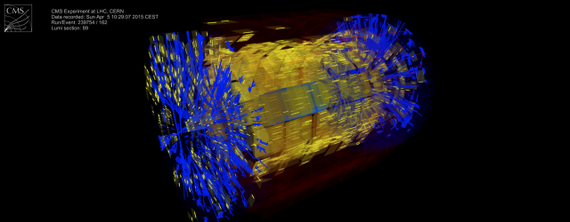You might have heard that the Large Hadron Collider (LHC) is back online. In the past few weeks, it started circulating beams and then they were able to ramp up the energy per beam to 6.5 trillion electron volts which is a new record, up from the previous 4 trillion electron volts. In our CMS detector, we were able to record beam splash events which light up the detector and tell you what is working and what isn't.
We are busy commissioning our detector to make sure that everything is working well. These beam splash events show things are going pretty well with our detector. Now we have to time the detector to coordinate it with the beam as well as align all of the detectors so we know where they are located with respect to each detector. For the LHC, it will be a few months now commissioning until we expect collision data in our detectors. They have to figure out how to keep the protons circulating for longer and longer periods. This involves getting the approximately 10,000 magnets working together optimally. They then have to figure out how to put more and more protons in the machine so that there can be a higher probability for creating collisions when the beams are brought together.
Meanwhile, there was the American Physical Society's April Meeting in Baltimore. Here, particle physicists, astrophysicists, and other physicists present their latest results. Some of the headline results include the first maps of dark matter. A good description and picture of the results can be found here. This meeting is always interesting as several hundred graduate students are giving talks and presenting posters. As a graduate student, way back, this was the first international science meeting where I gave a presentation. This year, there were many presentations about the properties of the Higgs boson for instance. Every one of these presentations represents a significant amount of effort and sweat equity advancing the realm of human knowledge forward. So remember while we wait for new collisions at the LHC, there are people analyzing data we've already taken as well as people preparing the detectors and accelerators to give us new data.

